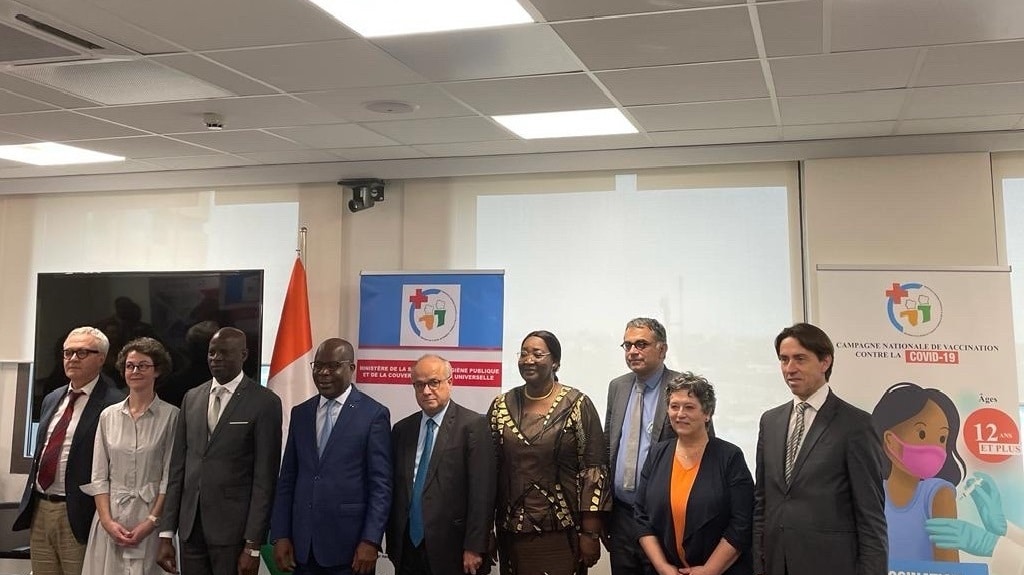Co-operation between France and Western African countries in the field of healthcare is a long-term venture. It has taken another step forward following the launch of PRISME-RDC (Democratic Republic of Congo) and PRISME-CI (Côte d’Ivoire).
In Côte d’Ivoire, the PAC-CI program was launched back in 1996 to carry out joint HIV research projects. It has evolved over time but still has the mission of training personnel in medical research and implementing useful research into infectious diseases for affected populations. On January 24, 2023, PAC-CI became PRISME-CI (International Research Platform in Global Health – Côte d’Ivoire). The University of Bordeaux, the IRD (Research Institute for Development) and Inserm (the National Institute of Health and Medical Research) have made a commitment with the ANRS | Emerging Infectious Diseases.
The DRC and France started to work together on the origins of HIV in the 2000s, then on successive Ebola epidemics since 2018. The two countries also carried out joint research projects into Covid-19 and Mpox. The new international research platform in global health (PRISME-RDC) was inaugurated in Kinshasa on March 4, 2023, during a ceremony attended by the President of France, who was visiting the country.
Emmanuel Macron took the opportunity to exchange ideas with the research teams at the National Institute of Biomedical Research (INRB), a pillar of the program, alongside the ANRS, the IRD, Inserm, the University of Montpellier, the University of Kinshasa, the Congolese health authorities (Ministry of Public Health), and the French Embassy in DRC.
In May 2022, a PRISME international research platform was also launched in Guinea.
The platforms will be open to all those who want to put forward projects in a governance space. The ANRS, in addition to being the initiator, supports partners in these three countries financially and technically. “The PRISME platforms are shared spaces that bring together researchers from each country and develop ambitious projects that address national and global health issues,” said Eric d’Ortenzio, strategy and partnerships department manager for the ANRS. The Ministries of Health are consistent stakeholders, notably on a financial level (the Ministries of Higher Education and the Economy are also involved in Côte d’Ivoire).
“With PRISME, we bring together French health operators operating in Côté d’Ivoire and the Democratic Republic of Congo and provide them with greater visibility. PRISME is a shared research framework that makes it possible to jointly define research priorities on major global health issues, acquire knowledge and train young researchers and scientists,” Eric d’Ortenzio, strategy and partnerships department manager of the ANRS | Emerging Infectious Diseases.
This transition implies an increase in Franco-African co-operation. “While PAC-CI was mainly dedicated to HIV and hepatitis, with PRISME, we will extend the fields of co-operation to other pathologies and themes that are health-related but also concern the environment, economy or sociology,” said Thérèse N’Dri Yoman, co-ordinator of the PAC-CI program.
Training constitutes one of the most important elements of these partnerships for all parties. Researchers will be able to benefit from upgrades, and students will be supported online or face-to-face (whether they are taking undergraduate degrees, masters or doctorates). “Exchanges will be two-way. It is a bilateral movement and this is very important,” Eric d’Ortenzio stated.“For example many students from Bordeaux come to train in Côte d’Ivoire.”
It is expected that around fifteen projects will be posted to the Ivorian platform, on themes as diverse as tuberculosis and Covid-19.
“The PRISME platform is crucial for medical and scientific research in Côte d’Ivoire. We are beneficiaries of the achievements of the previous PAC-CI program, and this time more operators are involved: the IRD (Research Institute for Development) and Inserm but also three Ivorian Ministries (the Ministry of Health, the Ministry of Higher Education and the Ministry of the Economy). This gives us a genuine international presence. We will continue to provide high-quality training to researchers and students, and expand to include themes such as the environment, the economy or social sciences,” Thérèse N’Dri Yoman, co-ordinator of the PAC-CI Program.
These agreements serve only to strengthen what was initiated a long time ago in research into infectious diseases. This strengthening will lead to even greater multi-disciplinary and multi-institutional research in order to improve the health of local populations, with a training component to increase young researchers’ expertise.
In the DRC, PRISME will for example operate in line with ongoing research projects, such as the PREZODE initiative (Preventing ZOonotic Disease Emergence). Launched in 2021, it aims to detect and prevent zoonotic diseases that are at the origin of pandemics (in a collaboration between the INRB in Kinshasa, the IRD in Montpellier, the AFD [French Development Agency] and Cirad [International Cooperation Center for Agronomic Research and Development]).
PRISME will operate on the premises of the INRB, principally in the virology department under the leadership of Dr Steve Ahuka. The laboratory employs around thirty scientists. It is fitted out for serology analysis and cell culture up to sequencing.
“This partnership allows a permanent exchange of ideas between the different researchers and institutions. It creates a collaboration framework on themes of common interest and also enables joint responses to calls for projects and calls for tenders on such themes. (…) The previous agreement already helped us equip ourselves, train teams and maintain an optimal level of work. PRISME will further enhance this performance,” Steve Ahuka, head of the Department of Virology of the INRB (National Institute for Biomedical Research).
Both platforms are already operational.



